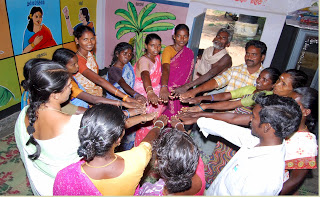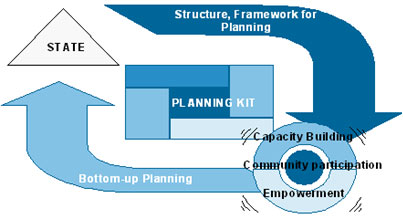Decentralized Planning in Public Health

Responding to local needs and customizing interventions to needs determined through participation of communities are much talked of in the public health discourse worldwide. There is a wide gap between this concept and the approach employed and capacities that exist to absorb this approach to ensure that public health plans match the demands of the communities and optimal resources are allocated accordingly. In the absence of this, one cannot expect to achieve the desired outputs and outcomes and resources may not get effectively geared towards better health outcomes. Over the years EHI International has through large scale experience of working with public health systems, governments and communities, tested and evolved an approach towards decentralized planning process which can be customized to any local situation.
What we Offer?
- Creating an enabling policy environment for decentralized planning
- Institutional Capacity Building Framework for decentralized planning
- Innovative strategies and techniques for community participation in planning process
- Tools, guidelines and manuals enabling bottoms up planning
- Facilitation of bottoms-up planning process
- Guidelines and processes for integration of lower level plans to ensure appropriate reflection of grassroots level needs
- Support for strategic mix of bottoms-up and top-down approaches towards gradual shift to complete decentralized planning
- Support in integrating financial allocations and the planning cycle in sync with the overall budgetary allocations and financial cycle of governments
- Developing detailed implementation framework and tracking tool for implementation of plans
Decentralized Planning Toolkit

Our References
India, (European Commission: 1999 – 2005), Health and Family Welfare Sector Investment Program
As a part of the sector reform initiative, EHI International supported Government of India and 24 state governments in developing decentralized integrated District Health Action Plans for 90 districts using the “slice-analysis” approach after helping them set up integrated District Health Societies.
India – Madhya Pradesh, (DFID: 2004 – 2005) Decentralized District Health Action Plans under Reproductive and Child Health Program, Phase II (RCH – II)
EHI International supported all the 45 districts in Madhya Pradesh and more intensively 28 districts in developing district action plans under RCH-II through block and district level consultations. All these plans were later integrated into the State Action Plan for RCH-II.
India – Bihar, Haryana, Himachal Pradesh, Jammu and Kashmir, Mizoram, Punjab, Rajasthan (State Governments: 2006 – 2008) Decentralized Plans under the National Rural Health Mission
National Rural Health Mission envisaged preparation of village plans, panchayat plans, block plans, district plans and finally the Integrated State Health Action Plan for funding support from Government of India. Over the years EHI International played a prominent role in building capacities and facilitating preparation and integration of decentralized plans in seven states in India:
| Bihar: | 25,000+ village plans, more than 5000 panchayat plans, 500+ block plans, 36 district plans, State Plan |
| Haryana: | more than 3000 village plans, 54 block plans, 9 district plans |
| Himachal Pradesh: | 1 district plan |
| Jammu and Kashmir: | 7537 village plans, 140 block plans, 22 district plans, 1 State Plan |
| Mizoram: | 9 district plans, 1 State Plan |
| Punjab: | 12000 village plans, 141 block plans, 20 district plans, 1 State Plan |
| Rajasthan: | 37 block plans, 6 district plans, and technical support for the state plan |
The above planning process included facilitating the preparation of public health facility improvement plans through facility surveys focusing on service, infrastructure, human resource and equipment gaps.
India – Bihar, Punjab (State Governments) Preparation of State Project Implementation Plan for Reproductive and Child Health
EHI International supported the states of Bihar (UNICEF) and Punjab (state government) in preparing Project Implementation Plans for the second phase of Reproductive and Child Health Program.
India – Madhya Pradesh (State Government: 2000) Visioning Exercise for Planning Process: World Bank funded Swashakti (Women’s Empowerment) Project
EHI International supported the Swashakti Project in Madhya Pradesh through a visioning and strategic planning exercise involving all the project districts in Madhya Pradesh for developing a perspective medium term strategic plan.
India – Himachal Pradesh (GTZ: 2000-2007) Basic Health Project
Under this project EHI International provided capacity building and facilitation support on strategic planning process by training all the officers of the Directorate of Health Services at the state level and all the health officials of the 5 project districts on Strategic Planning, Decentralized Planning, Financial Management, etc and facilitated the process of building local capacities for decentralized planning.
Our Vision
To be a Leading Multi-dimensional Resource Organisation Partnering in Transformation with Client Organisations to Provide Turnkey Solutions in Healthcare, for the Public, Private and Voluntary Sectors
Our Mission
To Improve Quality and Accessibility of Health Services by Bringing High Quality Expertise, Technology and Experience into Partnerships with Client Organisations to achieve Sustainable, Cost-effective and Customised solutions, thus transforming them to always be leaders.
Tenders
View all our tenders issued.

